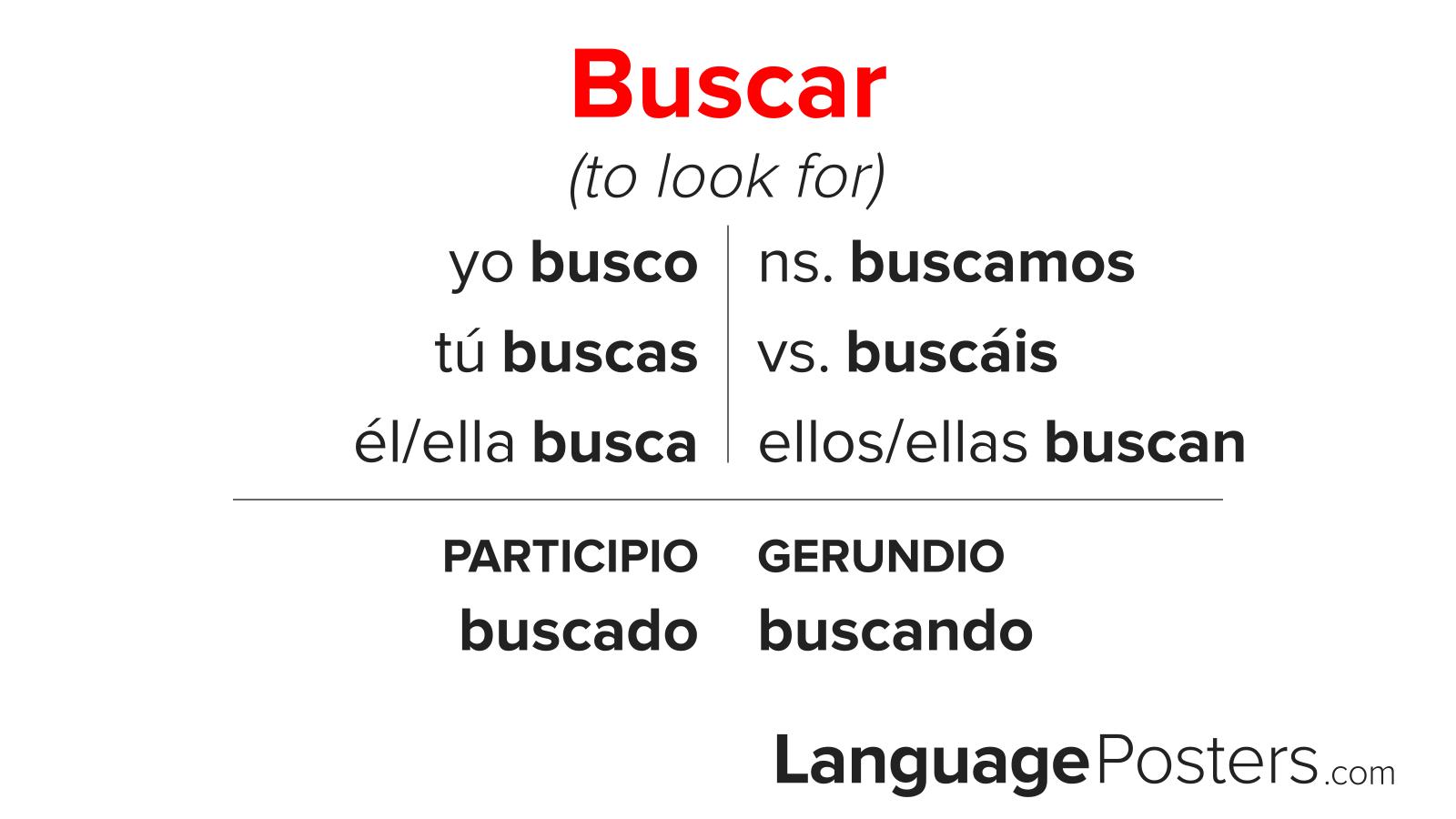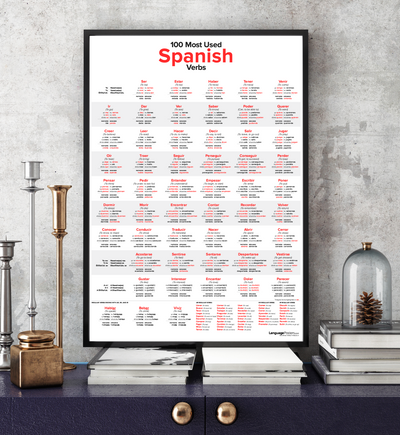Spanish Verbs
Buscar Conjugation

Buscar is a Spanish irregular AR verb meaning "to look for" or "to search". Irregular verbs are verbs which do not follow the standard conjugation patterns of Spanish regular verbs.
Buscar is ranked on the 100 Most Used Spanish Verbs Poster as the #3 most used irregular verb.
Present Tense
Past Tenses
Future Tenses
Subjunctive Tenses
Further Reading
100 Most Used Spanish Verbs Poster w/ Study Guide
A selection of the most used irregular and regular Spanish verb conjugations. A must have for anyone who wants to learn Spanish!
Buscar Conjugation
| Pronoun | Conjugation | Translation |
|---|---|---|
| Yo | busco | I look for |
| Tú | buscas | You look for |
| Él/Ella/ |
busca | He/She looks for |
| Nosotros | buscamos | We look for |
| Vosotros | buscáis | You (plural) look for |
| Ellos/ |
buscan | They look for |
* Irregular forms are highlighted in red
Buscar Participio
The Participio or Past Participle of Buscar is buscado. This is used to form the Buscar Present Perfect and the Buscar Past Perfect.
Buscar Gerundio
The Gerundio or Present Participle of Buscar is buscando. This is used to form the Buscar Present Continuous.
Buscar Present Continuous
The Present Continuous (presente progresivo or presente continuo) is used to describe actions that are happening right now or around now. To form the present continuous tense, combine the Estar conjugation with the Buscar Gerundio (or Present Participle).
Example: Él está siendo muy egoísta últimamente. (He is being very selfish lately.)
| Pronoun | Conjugation | Translation |
|---|---|---|
| Yo | estoy buscando | I am looking for |
| Tú | estás buscando | You are looking for |
| Él/Ella/ |
está buscando | He/She is looking for |
| Nosotros | estamos buscando | We are looking for |
| Vosotros | estáis buscando | You (plural) are looking for |
| Ellos/ |
están buscando | They are looking for |
* Irregular forms are highlighted in red
Back to topBuscar Past Tense
Spanish has several past tenses, each serving a specific purpose to express actions in the past.
Additionally, the use of Spanish past tenses can vary significantly across regions due to cultural and linguistic differences.
These are some of the most commonly used Spanish past tenses:
Buscar Preterite
The Preterite Tense (Pretérito or Indefinido) is used for completed actions in the past that have a clear beginning or end.
Example: Ayer comí pizza. (Yesterday, I ate pizza).
| Pronoun | Conjugation | Translation |
|---|---|---|
| Yo | busqué | I looked for |
| Tú | buscaste | You looked for |
| Él/Ella/ |
buscó | He/She looked for |
| Nosotros | buscamos | We looked for |
| Vosotros | buscasteis | You (plural) looked for |
| Ellos/ |
buscaron | They looked for |
* Irregular forms are highlighted in red
Back to topBuscar Imperfect
The Imperfect Tense (Imperfecto) describes ongoing, habitual, or background actions in the past, often without a defined start or end.
Example: Cuando era niño, jugaba fútbol todos los días. (When I was a child, I used to play soccer every day).
| Pronoun | Conjugation | Translation |
|---|---|---|
| Yo | buscaba | I used to look for |
| Tú | buscabas | You used to look for |
| Él/Ella/ |
buscaba | He/She used to look for |
| Nosotros | buscábamos | We used to look for |
| Vosotros | buscabais | You (plural) used to look for |
| Ellos/ |
buscaban | They used to look for |
* Irregular forms are highlighted in red
Back to topBuscar Present Perfect
The Present Perfect Tense (Presente Perfecto) is used to describe actions that have been completed recently or have relevance to the present moment. The Present Perfect Tense is formed by combining the Present Tense of the auxiliary verb Haber Conjugation with the Buscar Participio.
Example: He leído ese libro. (I have read that book).
| Pronoun | Conjugation | Translation |
|---|---|---|
| Yo | he buscado | I have looked for |
| Tú | has buscado | You have looked for |
| Él/Ella/ |
ha buscado | He/She has looked for |
| Nosotros | hemos buscado | We have looked for |
| Vosotros | habéis buscado | You (plural) have looked for |
| Ellos/ |
han buscado | They have looked for |
* Irregular forms are highlighted in red
Back to topBuscar Past Perfect
The Past Perfect Tense (Pluscuamperfecto) refers to actions completed before another action in the past. The Past Perfect Tense is formed by combining the Imperfect Tense of the auxiliary verb Haber Conjugation with the Buscar Participio.
Example: Había comido antes de salir. (I had eaten before leaving).
| Pronoun | Conjugation | Translation |
|---|---|---|
| Yo | había buscado | I had looked for |
| Tú | habías buscado | You had looked for |
| Él/Ella/ |
había buscado | He/She had looked for |
| Nosotros | habíamos buscado | We had looked for |
| Vosotros | habíais buscado | You (plural) had looked for |
| Ellos/ |
habían buscado | They had looked for |
* Irregular forms are highlighted in red
Back to topBuscar Future Tense
The Future Tense (Futuro) is used to describe actions or events that will happen in the future. It often expresses certainty or plans about what is yet to come.
Example: Mañana comeré pizza. (Tomorrow, I will eat pizza).
| Pronoun | Conjugation | Translation |
|---|---|---|
| Yo | buscaré | I will look for |
| Tú | buscarás | You will look for |
| Él/Ella/ |
buscará | He/She will look for |
| Nosotros | buscaremos | We will look for |
| Vosotros | buscaréis | You (plural) will look for |
| Ellos/ |
buscarán | They will look for |
* Irregular forms are highlighted in red
Back to topBuscar Conditional Tense
The Conditional Tense (Condicional) is used to express hypothetical situations, polite requests, or actions that depend on other conditions. It is often used in combination with the Future Tense.
Example: Me gustaría un café, por favor.(I would like a coffee, please).
| Pronoun | Conjugation | Translation |
|---|---|---|
| Yo | buscaría | I would look for |
| Tú | buscarías | You would look for |
| Él/Ella/ |
buscaría | He/She would look for |
| Nosotros | buscaríamos | We would look for |
| Vosotros | buscaríais | You (plural) would look for |
| Ellos/ |
buscarían | They would look for |
* Irregular forms are highlighted in red
Back to topBuscar Subjunctive
The Subjunctive Tense (Subjuntivo) is used to express doubt, uncertainty, desire, or emotion. It is often used in dependent clauses introduced by specific conjunctions or verbs.
Example: Espero que seas feliz. (I hope you are happy).
| Pronoun | Conjugation | Translation |
|---|---|---|
| Yo | busque | I look for |
| Tú | busques | You look for |
| Él/Ella/ |
busque | He/She looks for |
| Nosotros | busquemos | We look for |
| Vosotros | busquéis | You (plural) look for |
| Ellos/ |
busquen | They look for |
* Irregular forms are highlighted in red
Back to topSpanish Regular Verbs
A verb is called a regular verb when its conjugation follows a consistent and predictable pattern. In contrast, a verb that does not follow these standard patterns is called an irregular verb. In Spanish, the three regular conjugation patterns are based on the verb endings: -AR, -ER, and -IR.

Spanish Conjugation Chart
Looking for more Spanish verbs like Buscar? Check out our Spanish Conjugation Chart, the 100 Most Used Spanish Verbs Poster!
Back to top

